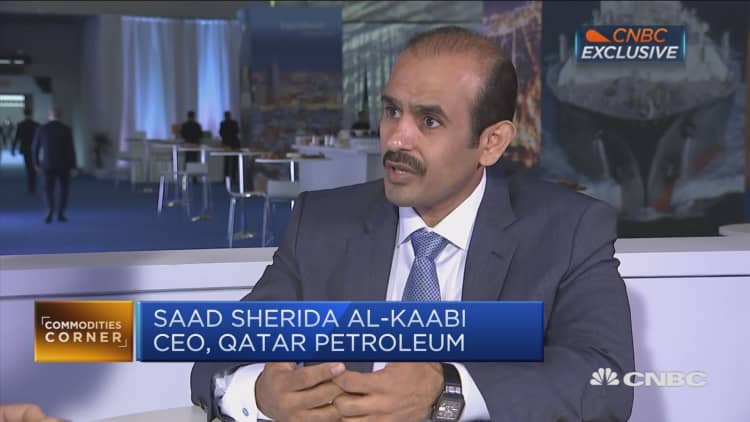On the production side, U.S. shale gas is performing strongly — but a trade war with China and a lack of investment projects in the sector could be "economically disruptive", according to the International Energy Agency (IEA).
"Without additional investments into American liquified natural gas (LNG) projects, the American gas industry will have to keep gas on the ground, which would be a waste of capital, economically quite disruptive," Laszlo Varro, chief economist at the IEA, told CNBC's Steve Sedgwick at the GasTech conference in Barcelona on Tuesday.
U.S. natural gas is being produced at record levels thanks to the shale revolution, brought about by the extraction technique known as fracking. And the booming demand for LNG in Asian markets, China in particular, should mean massive business for U.S. gas exporters.
But major bottlenecks in export capacity lie ahead due to global trade tensions and a lack of sufficient investment into projects for export infrastructure, the IAE has warned.
"If there is no export infrastructure development, then a large amount of American gas will simply stay on the ground," Varro explained. "Because given that the domestic energy system is not going to be able to absorb that much gas domestically, if there are no export projects, then American gas prices will have to go down to a very low level to shut production down."
Energy industry forecasters predict a global demand for 500 million tons of LNG by 2030. That demand will be coming from Asia's emerging economies, in particular, with gas as a major part of China's growth plan in terms of energy consumption. Forty-five percent of China's natural gas will need to be imported, and the U.S. is expected to supply a vast amount of that need.
But this week's announcement that the White House is raising tariffs on an additional $200 billion worth of Chinese goods does not bode well for prospects for trade, consequently stunting support for export infrastructure investments.

Chinese authorities already promised to retaliate against the new tariffs, and have signaled their readiness to slap 25 percent tariffs on U.S. LNG imports, among other things. For competitor countries like Qatar or Canada this may be a good thing, but energy executives still maintain it won't be positive for the larger market.
"I don't think it's to the benefit of the oil and gas industry having politics and taxation entered into this," Saad Sherida Al-Kaabi, the chief executive of Qatar Petroleum, told CNBC. "It could be serving for Qatar to have us more competitive in comparison to the U.S. when some of the countries put taxes on U.S. LNG. But I don't think long-term it's good for the market." Qatar Petroleum is the world's largest exporter of LNG.
Meanwhile, U.S. regulators seem optimistic that the reliability of long-term U.S. contracts and its stability as an energy producer will continue to win buyers.
Energy players around the world are "bullish on the possibility of getting U.S. LNG," said Neil Chatterjee, commissioner at the U.S. Federal Energy Regulatory Committee (FERC). He pointed to what countries see as the economic and geopolitical benefits of doing business with American gas producers.
"The U.S. is a stable and reliable partner, you can have long-term contracts with U.S. companies," he said. "So in every conversation since coming to GasTech, I'm not seeing those concerns expressed. People are very bullish about partnering with the U.S."

Still, market watchers are largely predicting things will get worse before they get better in the trade tariff retaliation game between the world's two largest economies. And if U.S. LNG can't get into Chinese ports, the gas industry is looking at problems.
Despite all this, the IEA's forecasts for the energy industry assumes international trade will function without disruption, and therefore expects excess U.S. gas production to go toward meet China's need for natural gas.
"Our basic assumption is that international trade of LNG will continue," Varro said. "And investors very much hope that the trade policy decisions will support this."


